初二英语(宾语从句)
八年级下册宾语从句讲解课件

虚拟语气
在某些特定语境下,宾语 从句需要使用虚拟语气, 表示与实际情况相反的情 况。
时态的特殊用法
在某些特定情况下,宾语 从句可以使用特殊时态, 如过去进行时、将来完成 时等。
宾语从句的语序
陈述句语序
宾语从句应使用陈述句语 序,即主语+谓语的顺序 。
倒装语序
在某些特定语境下,宾语 从句可以使用倒装语序, 以强调某个部分或强调某 种语气。
特殊疑问句做宾语从句
总结词
特殊疑问句做宾语从句时,通常 用来表达对某个具体问题的疑问 。
详细描述
特殊疑问句做宾语从句时,需要 将疑问词放在句首,并用适当的 关联词引导,例如:“I don’t know which book she likes best.”
选择疑问句做宾语从句
总结词
选择疑问句做宾语从句时,通常用来表达两种或多种可能性。
详细描述
选择疑问句做宾语从句时,需要用or连接不同的选择项,并用适当的关联词引导 ,例如:“Please tell me which fruit you like, apples or oranges?”
03
宾语从句的时态和语序
宾语从句的时态
01
02
03
陈述句的时态
宾语从句的时态应与主句 保持一致,根据时间状语 和语境判断时态。
生在主句动作之。
从句的简化
总结词
从句的简化是指将复杂的宾语从句简化为简单句或省略某些成分的情况。
详细描述
在英语中,为了使句子更加简洁明了,可以将复杂的宾语从句简化为简单句或省略某些成分。例如, “I don’t know what to do”这句话中,可以将宾语从句“what to do”简化为简单句“I don't know what to do”,或者省略某些成分简化为“I don't know”。
初中宾语从句的讲解与运用

初中宾语从句的讲解与运用
宾语从句是一个句子作为主句的宾语。
它通常用来回答“我认为...
是什么”的问题。
宾语从句通常有以下几个特点:
1. 以连接词引导,常见的连接词有 that, whether, if, what, where, when, who, whom, whose, why, how等。
2.宾语从句的时态、语气和主句没有关系,主句是什么时态就用什么
时态,主句是陈述句就用陈述句,主句是疑问句就用疑问句。
3. 宾语从句可以出现在及物动词(如believe, think, know等)、
介词(如for, after, before等)后面,或者直接作为主句的宾语。
下面是一些常见的宾语从句的运用:
1.陈述句宾语从句:
- I think (that) he is a good student.(我认为他是个好学生。
)- She told me (that) the movie was interesting.(她告诉我电
影很有意思。
)
2.一般疑问句宾语从句:
- Do you know if it will rain tomorrow?(你知道明天是否会下
雨吗?)
- Can you tell me where the nearest post office is?(你能告
诉我最近的邮局在哪吗?)
3.特殊疑问句宾语从句:
4. 以if或whether引导的宾语从句:
- He asked if/whether I had finished my homework.(他问我是否完成了作业。
)。
中考英语专项复习专题【宾语从句】(附例题以及答案)

中考英语专项复习专题【宾语从句】(附例题以及答案)本章节内容:1. 宾语从句概述(时态,语序,引导词)2.宾语从句的注意点3.宾语从句解题技巧宾语从句为中考的必考点,主要在单项选择题中考查,侧重考查其引导词、语序、时态的应用。
一般至少会涉及两个考查点。
①引导词相同,语序和时态不同;②时态一致,语序和引导词不同。
而且通常都会在一些固定的句型中涉及,如I wonder,Would/Could you please tell me.,Can you tell me,Do you know,I don’t know等等。
考生在做此类试题时,首先从语序着手,宾语从句的语序应该为陈述句语序,即:主语+谓语+宾语+其他;再从时态考虑,一般情况下,宾语从句的时态要和主句的时态保持一致,但是,如果有明显的时间状语,要以时间状语来判断时态;最后,再根据答语来判断疑问词。
1宾语从句概述2注意点(1)否定转移当主句的主语为第一人称,谓语动词是think,believe,suppose等时,要将宾语从句的否定词转移到主句中,即主句的谓语动词用否定形式,而宾语从句的谓语动词用肯定形式。
I don’t think he will come with you.我认为他不会和你一起来。
(2)宾语从句的简化①当宾语从句的主语和主句的主语相同,且主句的谓语动词是hope,wish,decide,agree,choose等时,从句可简化为不定式结构。
I hope that I can receive your e-mail.=I hope to receive your e-mail.我希望能收到你的电子邮件。
②当宾语从句的主语和主句的主语相同,且主句的谓语动词是know,remember,forget,learn等时,从句可简化为“疑问词+不定式”结构。
She doesn’t know what she should do next.=She doesn’t know what to do next.她不知道下一步该做什么。
宾语从句初二
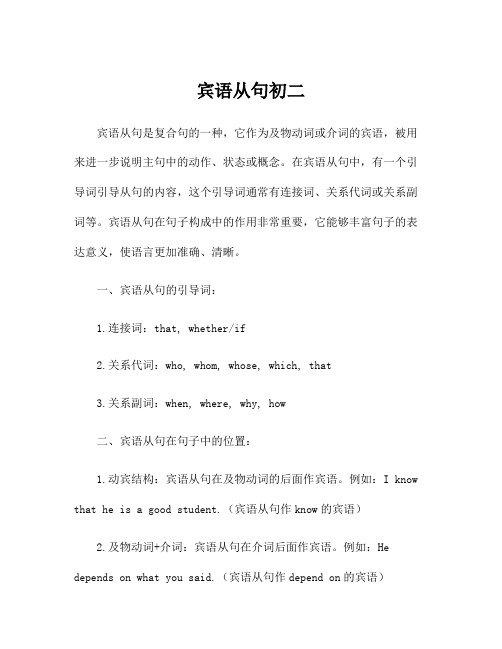
宾语从句初二宾语从句是复合句的一种,它作为及物动词或介词的宾语,被用来进一步说明主句中的动作、状态或概念。
在宾语从句中,有一个引导词引导从句的内容,这个引导词通常有连接词、关系代词或关系副词等。
宾语从句在句子构成中的作用非常重要,它能够丰富句子的表达意义,使语言更加准确、清晰。
一、宾语从句的引导词:1.连接词:that, whether/if2.关系代词:who, whom, whose, which, that3.关系副词:when, where, why, how二、宾语从句在句子中的位置:1.动宾结构:宾语从句在及物动词的后面作宾语。
例如:I know that he is a good student.(宾语从句作know的宾语)2.及物动词+介词:宾语从句在介词后面作宾语。
例如:He depends on what you said.(宾语从句作depend on的宾语)三、宾语从句的几种类型:1.陈述句宾语从句:表示客观事实或真理,在句子中用that引导。
例如:He said that he was tired.2.一般疑问句宾语从句:表示问句,在句子中用whether或if引导。
例如:I don't know whether/if he can come.3.特殊疑问句宾语从句:表示特定信息的问句,在句子中用关系代词引导。
例如:Do you know where he is?4.祈使句宾语从句:表示请求、命令等,在句子中用that引导。
例如:He ordered that they stop talking.5.感叹句宾语从句:表示感叹,在句子中用what或how引导。
例如:I can't believe what he did!在写宾语从句时,需要注意以下几点:1.引导词的选择:需要根据宾语从句的类型和句子意义选择适当的引导词。
2.语序的变化:在宾语从句中,主语和动词的位置一般不变,而其他成分的位置可能会发生改变。
初二英语重点之宾语从句用法
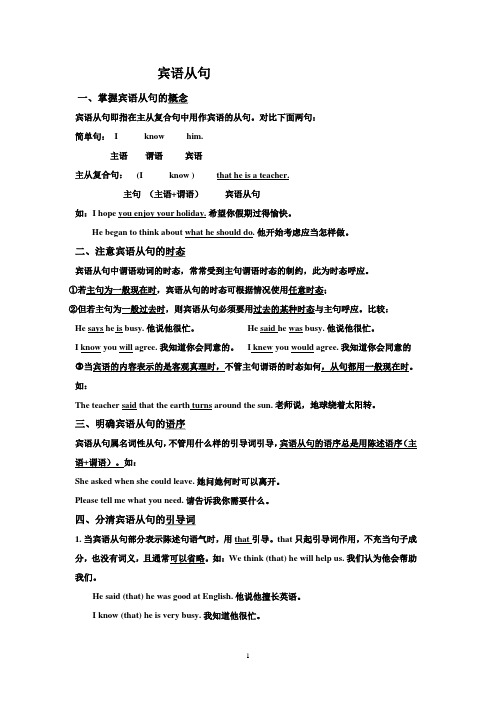
宾语从句一、掌握宾语从句的概念宾语从句即指在主从复合句中用作宾语的从句。
对比下面两句:简单句:I know him.主语谓语宾语主从复合句:(I know ) that he is a teacher.主句(主语+谓语)宾语从句如:I hope you enjoy your holiday. 希望你假期过得愉快。
He began to think about what he should do. 他开始考虑应当怎样做。
二、注意宾语从句的时态宾语从句中谓语动词的时态,常常受到主句谓语时态的制约,此为时态呼应。
①若主句为一般现在时,宾语从句的时态可根据情况使用任意时态;②但若主句为一般过去时,则宾语从句必须要用过去的某种时态与主句呼应。
比较:He says he is busy. 他说他很忙。
He said he was busy. 他说他很忙。
I know you will agree. 我知道你会同意的。
I knew you would agree. 我知道你会同意的 当宾语的内容表示的是客观真理时,不管主句谓语的时态如何,从句都用一般现在时。
如:The teacher said that the earth turns around the sun. 老师说,地球绕着太阳转。
三、明确宾语从句的语序宾语从句属名词性从句,不管用什么样的引导词引导,宾语从句的语序总是用陈述语序(主语+谓语)。
如:She asked when she could leave. 她问她何时可以离开。
Please tell me what you need. 请告诉我你需要什么。
四、分清宾语从句的引导词1. 当宾语从句部分表示陈述句语气时,用that引导。
that只起引导词作用,不充当句子成分,也没有词义,且通常可以省略。
如:We think (that) he will help us. 我们认为他会帮助我们。
He said (that) he was good at English. 他说他擅长英语。
完整版)初中英语宾语从句讲解
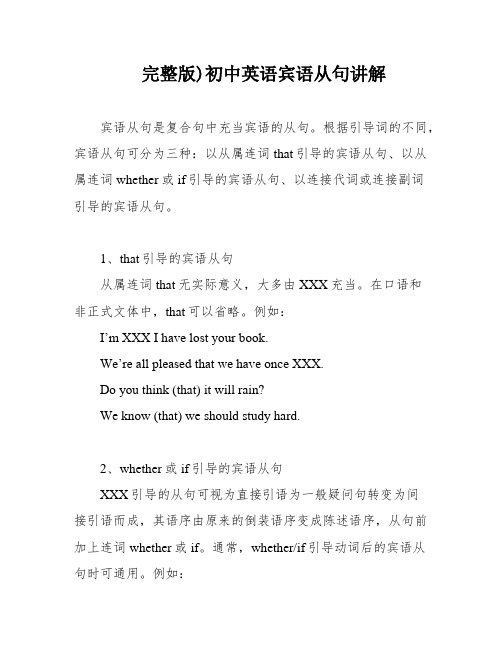
完整版)初中英语宾语从句讲解宾语从句是复合句中充当宾语的从句。
根据引导词的不同,宾语从句可分为三种:以从属连词that引导的宾语从句、以从属连词whether或if引导的宾语从句、以连接代词或连接副词引导的宾语从句。
1、that引导的宾语从句从属连词that无实际意义,大多由XXX充当。
在口语和非正式文体中,that可以省略。
例如:I’m XXX I have lost your book.We’re all pleased that we have once XXX.Do you think (that) it will rain?We know (that) we should study hard.2、whether或if引导的宾语从句XXX引导的从句可视为直接引语为一般疑问句转变为间接引语而成,其语序由原来的倒装语序变成陈述语序,从句前加上连词whether或if。
通常,whether/if引导动词后的宾语从句时可通用。
例如:I don’t know whether/if he’ll arrive in time.I am XXX.I asked him whether/if he had finished all XXX但是,有些情况只能用whether而不能用if,例如:引导介词的宾语从句时:I’m thinking of whether we should go shopping。
I’m not interested in whether she’ll be invited.与or not直接连用时:I can’t say whether or not he will come on time。
I don’t know whether or not t hey will come to help us.I am wondering whether we should admit that we have lostthis game.I don't care whether or not they will participate in the Winter Camp.An object clause XXX such as what。
八年级宾语从句知识点
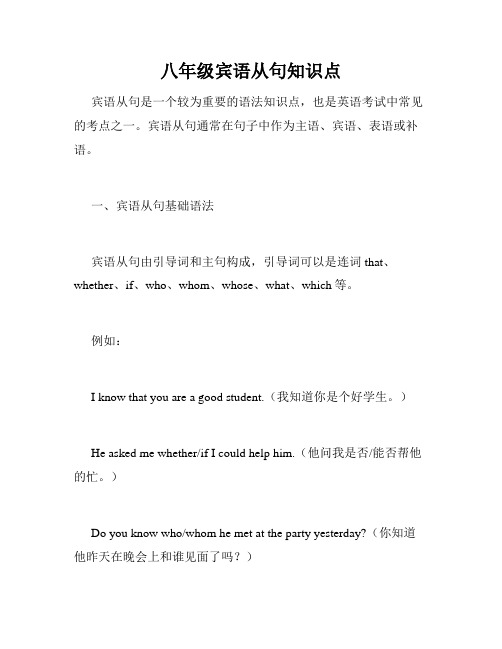
八年级宾语从句知识点宾语从句是一个较为重要的语法知识点,也是英语考试中常见的考点之一。
宾语从句通常在句子中作为主语、宾语、表语或补语。
一、宾语从句基础语法宾语从句由引导词和主句构成,引导词可以是连词that、whether、if、who、whom、whose、what、which等。
例如:I know that you are a good student.(我知道你是个好学生。
)He asked me whether/if I could help him.(他问我是否/能否帮他的忙。
)Do you know who/whom he met at the party yesterday?(你知道他昨天在晚会上和谁见面了吗?)She showed me what she had bought.(她给我看她买的东西。
)注意:1.当引导词为that时,可以省略,而且一般不加逗号。
例如:I believe (that) you can do it.Tom said (that) he didn't like the movie.2.当引导词为who或whom时,是否省略通常根据主语和宾语的关系而定。
例如:I know who/whom you are.(你是谁我知道。
)这里不能省略,因为who/whom在从句中是主语。
She asked who/whom I was helping.(她问我在帮助谁。
)这里可以省略who/whom,因为它在从句中是宾语。
二、宾语从句时态宾语从句的时态通常根据主句的时态而定。
1.主句为现在时,从句常用一般现在时或一般将来时。
例如:He said he likes football.(他说他喜欢足球。
)The teacher asked whether we will go to the library tomorrow.(老师问我们是否明天去图书馆。
)2.主句为过去时,从句一般用相应的过去时态。
八年级英语宾语从句知识点
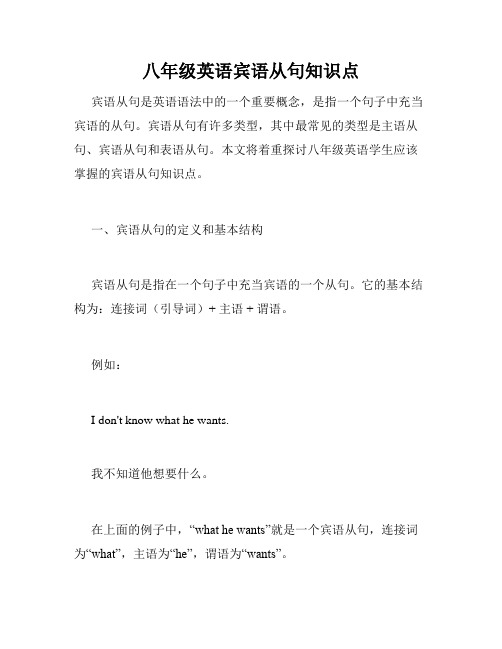
八年级英语宾语从句知识点宾语从句是英语语法中的一个重要概念,是指一个句子中充当宾语的从句。
宾语从句有许多类型,其中最常见的类型是主语从句、宾语从句和表语从句。
本文将着重探讨八年级英语学生应该掌握的宾语从句知识点。
一、宾语从句的定义和基本结构宾语从句是指在一个句子中充当宾语的一个从句。
它的基本结构为:连接词(引导词)+ 主语 + 谓语。
例如:I don't know what he wants.我不知道他想要什么。
在上面的例子中,“what he wants”就是一个宾语从句,连接词为“what”,主语为“he”,谓语为“wants”。
二、宾语从句的分类1. 主语从句主语从句是指在一个句子中充当主语的一个从句。
它的位置通常位于主句中谓语的前面。
例如:If you don't finish your work, what you want to do will be impossible.如果你不完成工作,你想做的事情将不可能。
在上面的例子中,“what you want to do”就是一个主语从句。
2. 宾语从句宾语从句是指在一个句子中充当宾语的一个从句。
它通常位于主句中动词的后面。
例如:I asked him where he had been last night.我问他昨晚去了哪里。
在上面的例子中,“where he had been last night”就是一个宾语从句。
3. 表语从句表语从句是指在一个句子中充当表语的一个从句。
它的位置通常位于主句之后,谓语之前。
例如:My main concern is how to improve my English.我的主要关心是如何提高我的英语。
在上面的例子中,“how to improve my English”就是一个表语从句。
三、宾语从句的引导词宾语从句的引导词是连词或连接副词。
最常见的宾语从句引导词有:1. that:它可以引导所有宾语从句的类型,在口语中可以省略。
宾语从句初中知识点归纳
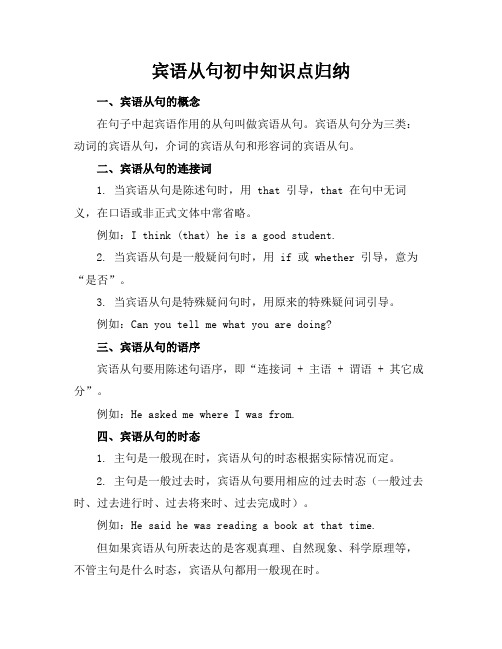
宾语从句初中知识点归纳一、宾语从句的概念在句子中起宾语作用的从句叫做宾语从句。
宾语从句分为三类:动词的宾语从句,介词的宾语从句和形容词的宾语从句。
二、宾语从句的连接词1. 当宾语从句是陈述句时,用 that 引导,that 在句中无词义,在口语或非正式文体中常省略。
例如:I think (that) he is a good student.2. 当宾语从句是一般疑问句时,用 if 或 whether 引导,意为“是否”。
3. 当宾语从句是特殊疑问句时,用原来的特殊疑问词引导。
例如:Can you tell me what you are doing?三、宾语从句的语序宾语从句要用陈述句语序,即“连接词 + 主语 + 谓语 + 其它成分”。
例如:He asked me where I was from.四、宾语从句的时态1. 主句是一般现在时,宾语从句的时态根据实际情况而定。
2. 主句是一般过去时,宾语从句要用相应的过去时态(一般过去时、过去进行时、过去将来时、过去完成时)。
例如:He said he was reading a book at that time.但如果宾语从句所表达的是客观真理、自然现象、科学原理等,不管主句是什么时态,宾语从句都用一般现在时。
例如:The teacher told us that the earth moves around the sun.五、宾语从句的否定转移当主句的主语是第一人称 I 或 we ,谓语动词是 think, believe, suppose, expect 等时,宾语从句的否定要转移到主句中。
例如:I don't think he is right. (而不是 I think heisn't right.)。
八年级上册英语语法重点:宾语从句
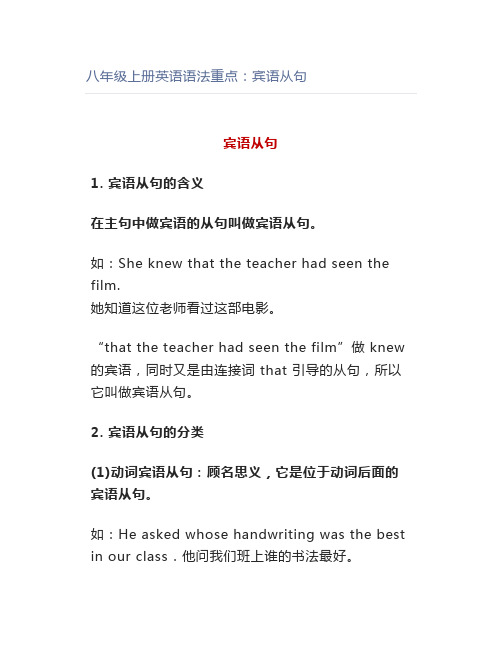
八年级上册英语语法重点:宾语从句宾语从句1. 宾语从句的含义在主句中做宾语的从句叫做宾语从句。
如:She knew that the teacher had seen the film.她知道这位老师看过这部电影。
“that the teacher had seen the film”做 knew 的宾语,同时又是由连接词 that 引导的从句,所以它叫做宾语从句。
2. 宾语从句的分类(1)动词宾语从句:顾名思义,它是位于动词后面的宾语从句。
如:He asked whose handwriting was the best in our class.他问我们班上谁的书法最好。
(2)介词宾语从句:顾名思义,它是位于介词后面的宾语从句。
如:I agree with what you said just now.我同意你刚才说的话。
(3)形容词宾语从句:顾名思义,它是位于形容词后面的宾语从句。
如:I am afraid that I will be late. 恐怕我要迟到了。
3. 引导名词性从句的连接词(1)that:没有含义,在宾语从句中不做成分(2)whether/if:表示是否,在宾语从句中不做成分。
I don't know if /whether he still lives here after so many years. 我不知道这么多年后,他是否还住在这里。
(3)连接代词:what, which, who, whom, whose(在宾语从句中做主、宾、表和定语)连接副词:where, when, how, why(在宾语从句中做状语)The small children don't know what is in their stockings.(what 在宾语从句中做主语)这些小孩子不知道什么在他们的长筒袜里。
Could you tell me why you were late for the meeting this morning?(why 在宾语从句中做原因状语)你能告诉我为什么你今天早上开会迟到吗?4. 在做宾语从句的题目时应注意两点(1)时态:①当主句是现在时态时,宾语从句可以根据需要使用任何时态。
初二英语(宾语从句)
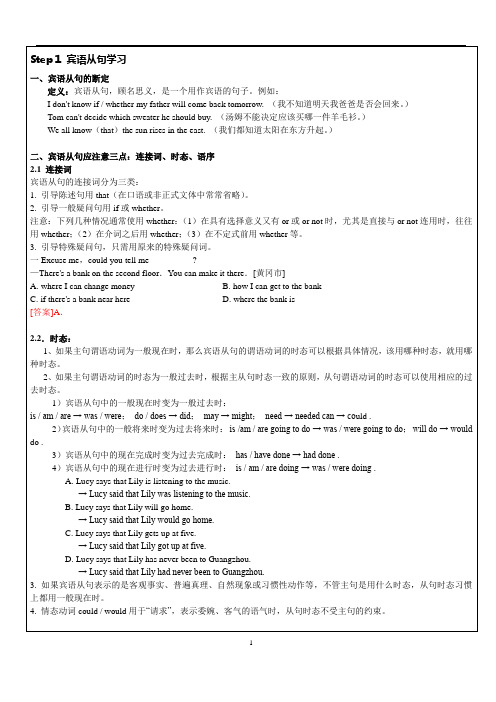
My dad walked out of the bathroom, next to the room, wearing nothing but a towel wrapped around him. When Shelia looked up he said, "Shelia, Pm Chuck's dad," and then he quickly pulled the towel from around himself and dropped it to the floor!We could remember her gasp to this day, and could just see my dad standing there with his long pants rolled up above his knee, with that giggle in his eye.Even if Mama served pancakes on paper towels I dare say none of us would miss an opportunity to go back there and renew our hearts with good memories till the dinner bell rang again.生词速查giggle 咯咯笑sister-in-law 弟媳recall 回忆wrapped 包住gasp 深吸气rolled up 卷起来( ) 1. The author thinks "Mama's house" and "Mama's cooking" are __________.A. poorB. specialC. ordinaryD. surprising( ) 2. The phrase "get so caught up in daily routine" means __________.A. be excited about daily activitiesB. be angry about everyday choresC. be upset by everyday troublesD. be busy with everyday life( ) 3. Chuck was probably the author's __________.A. friendB. nameC. brotherD. book( ) 4. Shelia was deeply impressed by __________A. the first meeting with her father-in-lawB. what the man said to herC. the members of Chuck's familyD. what the family had done( ) 5. We can tell from the story that __________.A. the author's father had a good sense of humorB. the author didn't like his father's jokeC. the author's family was poorD. the author's mother was a cook词数357 难度★★★★建议用时7' 实际用时__________ 阅读短文,判断正误,正确的写T(true),错误的写F(false)。
英语八年级宾语从句60个
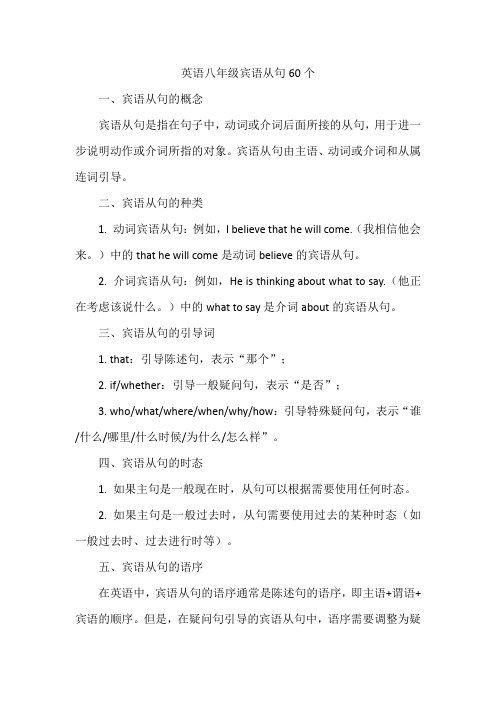
英语八年级宾语从句60个一、宾语从句的概念宾语从句是指在句子中,动词或介词后面所接的从句,用于进一步说明动作或介词所指的对象。
宾语从句由主语、动词或介词和从属连词引导。
二、宾语从句的种类1. 动词宾语从句:例如,I believe that he will come.(我相信他会来。
)中的that he will come是动词believe的宾语从句。
2. 介词宾语从句:例如,He is thinking about what to say.(他正在考虑该说什么。
)中的what to say是介词about的宾语从句。
三、宾语从句的引导词1. that:引导陈述句,表示“那个”;2. if/whether:引导一般疑问句,表示“是否”;3. who/what/where/when/why/how:引导特殊疑问句,表示“谁/什么/哪里/什么时候/为什么/怎么样”。
四、宾语从句的时态1. 如果主句是一般现在时,从句可以根据需要使用任何时态。
2. 如果主句是一般过去时,从句需要使用过去的某种时态(如一般过去时、过去进行时等)。
五、宾语从句的语序在英语中,宾语从句的语序通常是陈述句的语序,即主语+谓语+宾语的顺序。
但是,在疑问句引导的宾语从句中,语序需要调整为疑问句的语序。
六、宾语从句的用法举例1. That he will come to the meeting is certain.(他将会来参加会议是确定无疑的。
)2. I don’t know whether he will come or not.(我不知道他是否会来。
)3. Who will win the game is still unknown.(谁会赢得比赛仍然未知。
)4. He asked what the price of the book was.(他询问这本书的价格是多少。
)。
初中英语知识点:宾语从句
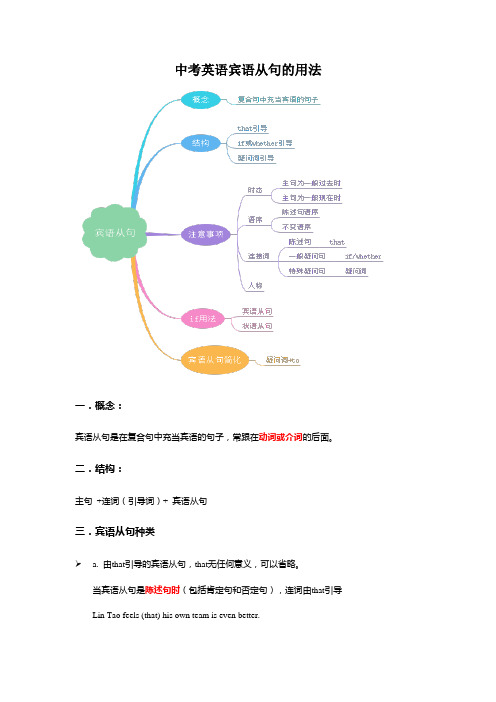
中考英语宾语从句的用法一.概念:宾语从句是在复合句中充当宾语的句子,常跟在动词或介词的后面。
二.结构:主句+连词(引导词)+ 宾语从句三.宾语从句种类➢ a. 由that引导的宾语从句,that无任何意义,可以省略。
当宾语从句是陈述句时(包括肯定句和否定句),连词由that引导Lin Tao feels (that) his own team is even better.She says (that) she won’t take part in the sports meeting next Sunday.注意:在主句为动词be加某些形容词(如sorry, sure, afraid, glad等)作表语时,后面所跟的省略that 的从句也可算是宾语从句。
I’m sorry (that) I don’t know .We’re sure (that) our team will win.➢ b. 由if或whether引导的宾语从句,if或whether表示“是否”,不可以省略。
当宾语从句是一般疑问句时,由连词whether或if引导I want to know if /Whether you still work in the factory.注意:一般情况下,if和whether可以互换,但以下3种情况只能用whether:①在不定式前:Whether to go there or not hasn’t been decided.②在介词前:It depends on(依靠) whether it is going to rain.③与or not连用:They are talking about whether to go there or not.➢ c. 由疑问词引导的宾语从句,疑问代词或疑问副词有意义,并在从句中充当一定的句子成分,不可以省略。
当宾语从句是特殊疑问句时,由连接代词(what, who, whom, which, whose)或连接副词(when, where, how, why)引导Do you know when we are going to Beijing?He wants to know who lives in this room.注意:带how的词组也都可以引导宾语从句。
初中英语知识归纳总结——宾语从句

初中英语知识归纳总结——宾语从句宾语从句知识概述宾语从句就是一个句子中另一个主句中作宾语,即宾语从句是用句子作宾语。
宾语从句的位置与陈述句结构中的宾语相同,它可作及物动词或介词的宾语。
常用的连词有that, if, whether, what, which, who, whom, when, where, how, why等。
教学重点1、宾语从句的结构(1) 由that引导的宾语从句that在从句中不充当任何句子成分,只起连接主句和从句的作用。
that不用翻译出来,在口语中常常省略,这种宾语从句常是陈述句。
The trouble is that we are short of money.(2) 由连词“if”或“whether”引导。
Whether或if在句中不充当任何句子成分,只起连接作用,但不能省略。
翻译为“是否”。
Do you know if Mr Smith is at home?(3) 由连接代词who, whom, whose, which, what或连接副词when, where, how, why等引导。
连接代词或连接副词位于从句的前面,起连接主句和从句的作用,从句用陈述句语序。
Do you know who broke the window?I don’t know when I shall finish.I wonder if the news is true.(4) 在某些形容词之后的从句有时也被看作宾语从句。
如afraid, sure, sorry, glad, worried, aware, confident, angry等。
They were angry that they had lost the chance.Can you tell me where the library is?I’m sorry that I’m late.2、宾语从句的时态一致(1) 主句是过去时,宾语从句要用过去时态;主句是现在时或将来时,宾语从句则该用什么时态就用什么时态。
初二宾语从句练习题加解析

初二宾语从句练习题加解析一、宾语从句练习题1. 请你告诉我你在哪里遇到了他?解析:这是一个宾语从句的特殊疑问句。
宾语从句中的主语是"你",谓语是"遇到",疑问词是"在哪里"。
答案:请你告诉我你在哪里遇到了他。
2. 我不知道他是否会来参加聚会。
解析:这是一个宾语从句的陈述句。
主语是"我",谓语是"知道",宾语从句中的主语是"他",谓语是"会来参加"。
答案:我不知道他是否会来参加聚会。
3. 她说她没看过那部电影。
解析:这是一个宾语从句的陈述句。
主语是"她",谓语是"说",宾语从句中的主语是"她",谓语是"没看过"。
答案:她说她没看过那部电影。
4. 请告诉我你是怎么学会弹吉他的。
解析:这是一个宾语从句的特殊疑问句。
宾语从句中的主语是"你",谓语是"学会",疑问词是"怎么"。
答案:请告诉我你是怎么学会弹吉他的。
5. 他不知道他应该做什么。
解析:这是一个宾语从句的陈述句。
主语是"他",谓语是"不知道",宾语从句中的主语是"他",谓语是"应该做"。
答案:他不知道他应该做什么。
二、宾语从句解析宾语从句是一个句子在另一个句子中作宾语的从句。
宾语从句常常由引导词引导,包括疑问词、连接代词以及连接副词。
1. 疑问词引导的宾语从句:疑问词包括"谁"、"什么"、"哪里"、"怎么"、"为什么"等。
当疑问词引导宾语从句时,宾语从句中的动词要根据引导词决定,同时注意将疑问句转为陈述句的语序。
初二宾语从句
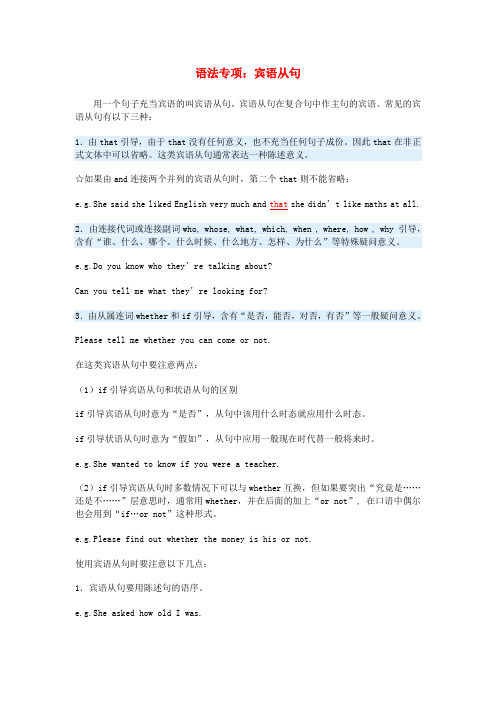
语法专项:宾语从句用一个句子充当宾语的叫宾语从句。
宾语从句在复合句中作主句的宾语。
常见的宾语从句有以下三种:1.由that引导,由于that没有任何意义,也不充当任何句子成份。
因此that在非正式文体中可以省略。
这类宾语从句通常表达一种陈述意义。
☆如果由and连接两个并列的宾语从句时,第二个that则不能省略:e.g.She said she liked English very much and that she didn’t like maths at all.2.由连接代词或连接副词who, whose, what, which, when , where, how , why 引导,含有“谁、什么、哪个、什么时候、什么地方、怎样、为什么”等特殊疑问意义。
e.g.Do you know who they’re talking about?Can you tell me what they’re looking for?3.由从属连词whether和if引导,含有“是否,能否,对否,有否”等一般疑问意义。
Please tell me whether you can come or not.在这类宾语从句中要注意两点:(1)if引导宾语从句和状语从句的区别if引导宾语从句时意为“是否”,从句中该用什么时态就应用什么时态。
if引导状语从句时意为“假如”,从句中应用一般现在时代替一般将来时。
e.g.She wanted to know if you were a teacher.(2)if引导宾语从句时多数情况下可以与whether互换,但如果要突出“究竟是……还是不……”层意思时,通常用whether,并在后面的加上“or not”, 在口语中偶尔也会用到“if…or not”这种形式。
e.g.Please find out whether the money is his or not.使用宾语从句时要注意以下几点:1.宾语从句要用陈述句的语序。
八年级英语宾语从句

三、宾语从句中的时态
1. 当主句是现在时或将来时的时候,宾语从句可以用所 需要的任何时态。 eg. We know (that) Mrs. Chen teaches English. I don’t know whether he has finished his homework. 2.主句是过去时,宾语从句一般只能用过去的某种时态 eg. I said I was reading a book at that moment. He wasn’t sure whether Sally would come or not. 3. 当从句叙述的是客观事实或一般真理时,宾语从句仍 然用现在时态。 eg. He told the boy that the earth goes around the sun.
that 在句中没有词汇意义,在从句中不能充当成分,只 是使读者清楚后面的句子是前面动词的宾语,在口语当中 往往省略。 一般情况下,当陈述句做宾语时用that引导。
eg.1. I hear (that) he will be back in an hour. (一小时后他会回来) 2. He said (that) he missed us very much. (他非常想念我们)
注意这些例句中的陈述语序。 Nhomakorabea把一个特殊疑问句放在宾语从句中,我们要做好两步: 1. 移。就是把特殊疑问句中的特殊疑问词移到句子中来; 2. 变。就是把特殊疑问词后面的一般疑问句变为陈述句语序。 e.g. How can I get to the station? I don’t know. 首先,我们把主句找出来,即:I don’t know. 那么接下来是我不 知道什么呢?后面就需要一个宾语从句,而后面的句子是以特殊 疑问词How来引导,所以, 第一步疑问词移下来变为:I don’t know how… 第二步看剩下的部分:can I get to the station? 是一个一般疑问 句,要改成陈述句,即把主语放到前面: I can get to the station. 加到前面的句子上。 那么这句话就变成了: I don’t know how I can get to the station.
- 1、下载文档前请自行甄别文档内容的完整性,平台不提供额外的编辑、内容补充、找答案等附加服务。
- 2、"仅部分预览"的文档,不可在线预览部分如存在完整性等问题,可反馈申请退款(可完整预览的文档不适用该条件!)。
- 3、如文档侵犯您的权益,请联系客服反馈,我们会尽快为您处理(人工客服工作时间:9:00-18:30)。
A. when your plane took offB. when did your plane take offC. when your plane takes offD. when does your plane take off8. . Jack's mother wants to know .A) when will Jack come backB) when Jack will come backC) when would Jack come backD) when Jack would come backKeys:1—5 BBABD 6—8 ACBStep 3 阅读训练日常生活词数336 难度★★★建议用时6'30'' 实际用时__________ Why is it there seems to be no place like "Mama's house" and no better cooking than "Mama's cooking"?Our families get so caught up in daily routine that we seldom get together until Mama calls. We can always expect the hugs to begin at the front door, and the laughter to start just inside it. Our day is filled with memories that make us smile as we break bread together.Some make us giggle out aloud and some make us cry with joy. In the end, we each walk around the house touching books on shelves that hold special meanings for us.Yesterday, my sister-in-law recalled the first time she ever came to our house. My brother had warned every member of our family—especially my dad—that he was bringing home someone special. We had all been warned to be on our best behavior.That night he brought her to meet the family. He led her back to the room where everybody was gathered, except my dad. Mama said that he was in the bathroom and would be right out. We could all tell how nervous Shelia was and never imagined what was about to happen.My dad walked out of the bathroom, next to the room, wearing nothing but a towel wrapped around him. When Shelia looked up he said, "Shelia, Pm Chuck's dad," and then he quickly pulled the towel from around himself and dropped it to the floor!We could remember her gasp to this day, and could just see my dad standing there with his long pants rolled up above his knee, with that giggle in his eye.Even if Mama served pancakes on paper towels I dare say none of us would miss an opportunity to go back there and renew our hearts with good memories till the dinner bell rang again.生词速查giggle 咯咯笑sister-in-law 弟媳recall 回忆wrapped 包住gasp 深吸气rolled up 卷起来( ) 1. The author thinks "Mama's house" and "Mama's cooking" are __________.A. poorB. specialC. ordinaryD. surprising( ) 2. The phrase "get so caught up in daily routine" means __________.A. be excited about daily activitiesB. be angry about everyday choresC. be upset by everyday troublesD. be busy with everyday life( ) 3. Chuck was probably the author's __________.A. friendB. nameC. brotherD. book( ) 4. Shelia was deeply impressed by __________A. the first meeting with her father-in-lawB. what the man said to herC. the members of Chuck's familyD. what the family had done( ) 5. We can tell from the story that __________.A. the author's father had a good sense of humorB. the author didn't like his father's jokeC. the author's family was poorD. the author's mother was a cook词数357 难度★★★★建议用时7' 实际用时__________ 阅读短文,判断正误,正确的写T(true),错误的写F(false)。
She had been shopping with her Mom in the supermarket. She must have been 6 years old, with beautiful brown haired and freckle-faced. It was raining heavily outside.We all stood there under the awning. We waited, some patiently and others angrily. I am always mesmerized by rainfall. I got lost in the sound and sight of the heavens washing away the dirt and dust of the world.Her voice was so sweet as it broke the hypnotic trance we were all caught in. "Mom, let's run through the rain," she said."What?" Mom asked."Let's run through the rain!" she repeated."No, Honey. We'll wait until it slows down a bit," Mom replied.This young child waited about another minute and repeated: "Mom, let's run through the rain.""We'll get wet if we do," Mom said."No, we won't, Mom. That's not what you said this morning," the young girl said as she caught her Mom's arm."This morning? When did I say we could run through the rain and not get wet?""Don't you remember? When you were talking to Daddy about his cancer, you said, 'If God can get us through this, he can get us through anything!'"The whole crowd stopped dead silent. I promise you couldn't hear anything but the rain. We all stood silently. No one came or left in the next few minutes. Mom paused and thought for a moment about what she would say.Now some would laugh it off and scold her for being silly. Some might even ignore what was said. But this was a moment of affirmation in a young child's life. "Honey, you are right. Let's run through the rain. If get wet, well maybe wejust need washing," Mom said. Then off they ran.We all stood watching, smiling and laughing as they ran past the cars. They held their shopping bags over their heads just in case they got wet. But they were followed by a few who screamed and laughed like children all the way to their cars. And yes, I did. I ran. I got wet. I needed washing.生词速查freckle-faced 雀斑脸awning 雨篷mesmerize 迷住hypnotic trance 昏昏欲睡cancer 癌症scold 责骂ignore 忽略affirmation 肯定( ) 6. The girl’s mother had beautiful brown haired and freckle-faced.( ) 7. All the people were standing under the awning patiently.( ) 8. The girl asked her mother to run through the rain twice.( ) 9. The girl believed that God could get them through anything.( ) 10. At last, the other children followed them to run through the rain happily.1. B 文章第一段讲到了没有什么能够比得上Mama’s house and Mama’s cooking。
